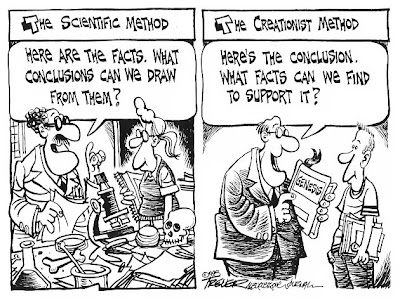Pulverizing the Monoliths
> Simplistic, much?After the article about her new book in the NY Times last week, Barbara Herrnstein Smith (the professor I hold responsible for my interest in all things science/religion related) has written a response. Her sentences are infinitely more articulate than my own, so I've copied some of them here.
"Contrary to what a number of readers concluded from Fish's description, "Natural Reflections" is not centrally about the truth or value of science or religion and does not argue for their equal authority in different realms of thought or practice. It is centrally about human cognition and argues that certain widely shared cognitive tendencies are exhibited equally by nonscientists and scientists, including some anthropologists and psychologists seeking to explain religion on the basis of evolutionary theory and cognitive science, and also equally by atheists and theists, including some theologians seeking to reconcile science and religion.A number of the general cognitive tendencies that I note, like projection, binary thinking and us/them thinking, are prominently displayed in the comments themselves. Especially evident is what I call "cognitive conservatism," that is, people's tendency to retain their beliefs, intellectual as well as religious, in the face of what strike other people as conclusively refuting arguments or clearly disconfirming evidence...Finally and most seriously, I think that the idea of science and religion as counterpoised monoliths deepens prevailing misunderstandings of both. As I emphasize throughout the book, the kinds of things that can be assembled under the term "religion" are exceptionally diverse. They range from personal experiences and popular beliefs to formal doctrines, priestly institutions, ritual practices and devotional icons – Neanderthal burial rites to Vatican encyclicals. The same can be said of "science," a term that embraces a wide range of quite different kinds of things – general pursuits and specialized practices, findings and theories, instruments and techniques, ideals and institutions (not to mention a share of devotional icons and ritual practices).The strong, snappy contrasts between Science and Religion offered in a great many of the comments (and in writings by a few scientists and philosophers that I discuss) depend on understandings of each that are exceedingly vague and, at best, highly selective. Those contrasts would lose much of their intellectual substance and all of their rhetorical bite if the writers drawing them were asked to indicate what specifically, in setting those mighty abstractions in opposition, they were actually talking about...Science and religion, in Gould's account, are nicely balanced and occupy equally valuable pieces of land, but they remain monoliths – precisely, as one commentator puts it, "rocks of ages." In "Natural Reflections," I seek to pulverize both of those rocks, not in order to annihilate them but in order to reveal their complex, copious, varied, and changing composition. In doing so, I stress their connections with each other, their continuity with other elements of human culture (yes, "Gods" is originally in lower case in the last passage Fish quotes from the book), and also the cognitive dispositions and liabilities exhibited by practitioners and proponents of both – scientists along with theologians, theists along with atheists, and, of course, Professor Fish along with myself."
Related Link:
